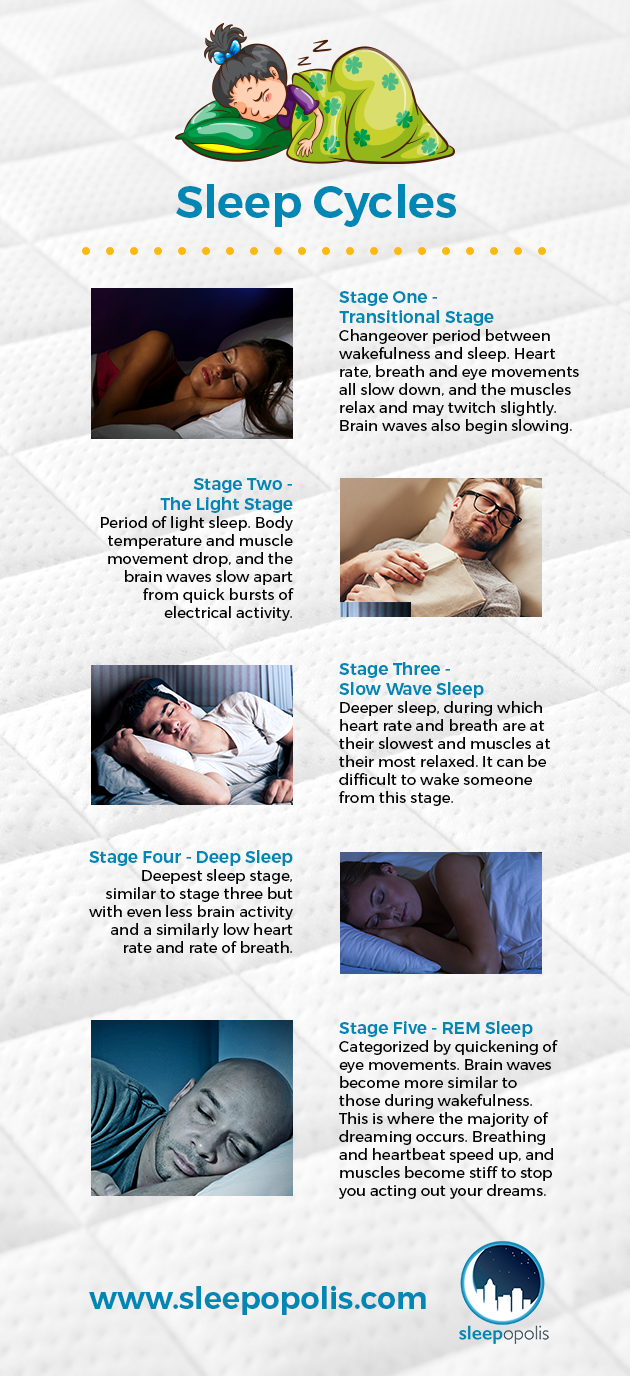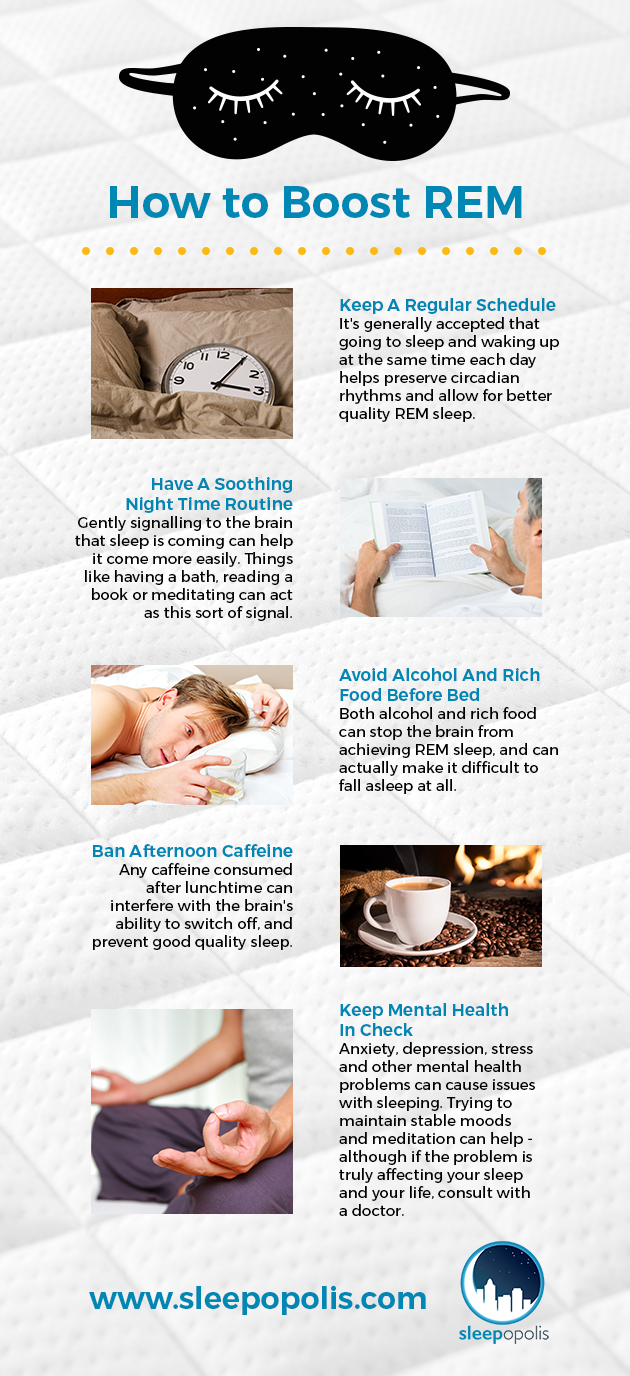During a typical eight hour sleep pattern, an adult spends only around one and a half hours in REM sleep. REM sleep is sometimes referred to as paradoxical sleep, due to its neurological and respiratory similarities to wakefulness. But in other ways, it’s the deepest stage of sleep, and incredibly important to maintain healthy brain function in particular.
Note: The information on Sleepopolis is meant to be informative in nature and is not written by medical experts. Please consult a healthcare professional if you experience chronic sleep issues that may be linked to a medical condition.
What Is REM Sleep?
REM is a mnemonic of Rapid Eye Movement. It’s the stage of sleep where eyes are darting back and forth, or “rapidly moving.” During REM sleep, blood flow towards the brain is decreased while blood flow to the muscles increases. It’s also estimated that REM sleep is where 80% of dreaming happens. It takes a while after falling asleep for REM to be attained, and it’s extremely important particularly for maintaining good brain health.
The Sleep Cycle
REM is the most brain-restorative part of sleep. A sleep cycle consists of around three stages of non-REM sleep before REM is reached. This cycle is important to help retain your circadian rhythm. If REM is disrupted, the next night your body may fall immediately into REM rather than following the sleep cycle. This can lead to feelings of grogginess, tiredness and lack of concentration – all of the typical side-effects associated with lack of sleep.

- Stage One – The Transitional Stage. This is the changeover period between wakefulness and sleep. Heart rate, breath and eye movements all slow down, and the muscles relax and may twitch slightly. Brain waves also begin slowing.
- Stage Two – The Light Stage. This is a period of light sleep. Body temperature and muscle movement drop, and the brain waves slow apart from quick bursts of electrical activity.
- Stage Three – Slow Wave Sleep. This is a deeper sleep, during which heart rate and breath are at their slowest and muscles at their most relaxed. It can be difficult to wake someone from this stage.
- Stage Four – Deep Sleep. This is the deepest sleep stage, similar to tage three but with even less brain activity and a similarly low heart rate and rate of breath.
- Stage Five. This is REM sleep, categorized by quickening of eye movements. Brain waves become more similar to those during wakefulness. This is where the majority of dreaming occurs. Breathing and heartbeat speed up, and muscles become stiff to stop you acting out your dreams.
During NREM (Non-REM) sleep, the body repairs itself – in particular the bones, body tissues and immune system. It seems that REM sleep is more important for repairing of the brain. It improves memory recall and reduces mental fatigue, alongside having emotional benefit.
Dreams
Many people think of REM sleep as “dreaming sleep.” Most people dream for around two hours per night. While some dreaming does occur in other stages of the sleep cycle, it’s true that the majority of dream happen during REM sleep. There is still some uncertainty about the actual cognitive function of dreams, but some researchers postulate that dreams are where the brain organizes thoughts, feelings and emotions, which helps regulate mood and boost brain function.
Why We Need REM Sleep
Without REM sleep, no matter how long you’re actually sleeping for, you won’t wake up feeling refreshed and invigorated. It’s absolutely essential in order to avoid feelings of daytime sleepiness and fatigue, and to ensure maximum concentration and work performance.
REM sleep is also important for repairing and protecting the brain. Without it, pathways through which memories are formed and stored can become damaged. It seems REM sleep is hugely beneficial to brain creativity, too. Immediately after waking the brain is “hyper-associative” – meaning likely to perform better at creative problem solving, anagrams and puzzles.
REM Sleep Deprivation
REM sleep deprivation, simulated in studies, has been shown to cause mild psychological disturbances like anxiety, erratic mood swings, low concentration and even mild hallucination. Appetite also tends to increase. Generally REM sleep deprivation seem to have similar symptoms to sleep deprivation in general. Even if you’re getting enough hours of sleep, if your circadian rhythms are disrupted and REM sleep is prevented, you will likely not feel as well rested and refreshed.
How To Boost REM Sleep

As we age, the amount of the sleep cycle spent in REM sleep drops. Babies spend as much as 50% of their time asleep in REM, while adults only around a third. And as we age, that can drop to eve lower than 20%. REM sleep is hugely important for mental and physical health – so here’s how to make sure you’re getting the most you can.
- Keep A Regular Schedule. It’s generally accepted that going to sleep and waking up at the same time each day helps preserve circadian rhythms and allow for better quality REM sleep.
- Have A Soothing Night Time Routine. Gently signalling to the brain that sleep is coming can help it come more easily. Things like having a bath, reading a book or meditating can act as this sort of signal.
- Avoid Alcohol And Rich Food Before Bed. Both alcohol and rich food can stop the brain from achieving REM sleep, and can actually make it difficult to fall asleep at all.
- Ban Afternoon Caffeine. Any caffeine consumed after lunchtime can interfere with the brain’s ability to switch off, and prevent good quality sleep.
- Keep Mental Health In Check. Anxiety, depression, stress and other mental health problems can cause issues with sleeping. Trying to maintain stable moods and meditation can help – although if the problem is truly affecting your sleep and your life, consult with a doctor.
- Get Your Environment Just Right. Many environmental factors can inhibit REM sleep, such as noise pollution, light pollution or an uncomfortable bed. Ensuring your environment is one which offers your personal maximum comfort will help sleep come easier and be of higher quality.


























